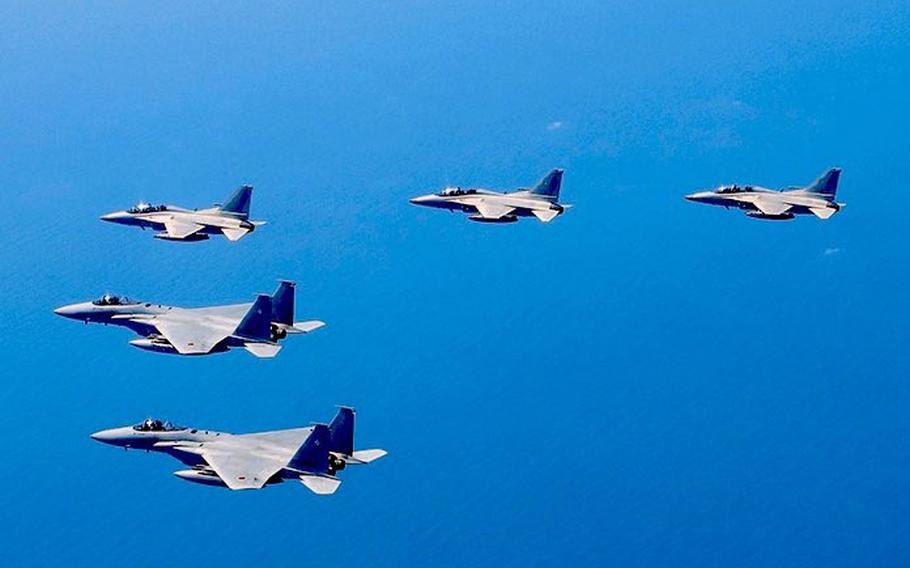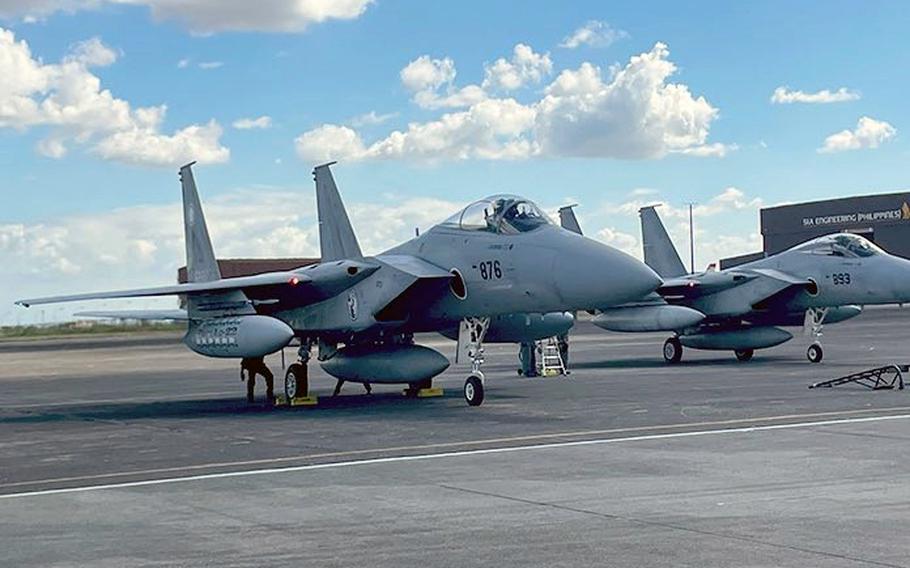
Japanese F-15J Eagle fighters fly in formation with Philippine Air Force FA-50s in this photo tweeted by the Japan Air Self-Defense Force, Wednesday, Dec. 7, 2022. (JASDF)
Japanese fighter jets are operating in the Philippines for the first time since World War II at a former U.S. air base, the Japan Air Self-Defense Force announced Wednesday.
A pair of Japanese F-15J Eagles landed Tuesday at the former Clark Air Base, north of Manila on the Philippines’ main island of Luzon, the Air Self-Defense Force tweeted the next day. The post included photographs of the jets parked at Clark, now an international airport, and flying in formation with Philippine FA-50 jets.
“We will promote mutual understanding by unit-to-unit exchanges with [the Philippine Air Force] and develop #DefenseCooperation and exchanges,” said the tweet, which noted the deployment marks the first time the Japanese air force, formed in 1954, has sent fighters to an Association of Southeast Asian Nations country.
Japanese forces in January 1942 overran the then-Clark Field, a U.S. Army Air Corps base that became a major hub for Japanese air operations. Kamikaze fighters launched attacks on U.S. warships from nearby Mabalacat before the area was recaptured in January 1945.
After the war, Clark and nearby Subic Naval Base formed America’s largest overseas military community before both were damaged in the 1991 eruption of Mount Pinatubo and, soon after, returned to the Philippines.
About 60 Japanese personnel arrived at Clark on Nov. 27 and are conducting exchanges with the Philippine Air Force through Sunday, according to a Nov. 21 statement from the Self-Defense Force.
The F-15s were due to fly out of Clark on Thursday, a Japanese air force spokesman told Stars and Stripes by phone Thursday. It’s customary in Japan for some government officials to speak to the media without giving their names.

Japanese F-15J Eagle fighters visit what was once Clark Air Base in the Philippines, in this photo tweeted by the Japan Air Self-Defense Force, Wednesday, Dec. 7, 2022. (JASDF)
The deployment comes as the U.S. Air Force begins a phased replacement with rotational forces of its F-15s at Kadena Air Base, Okinawa. Japan has also deployed a KC-767 tanker/transport aircraft and two C-2 transport aircraft to Clark for this month’s training, according to the Self-Defense Force statement.
Philippine troops are in Japan this week as observers at the annual U.S.-Japan Yama Sakura command post drills, which conclude Monday.
Japan has assisted the Philippines in recent years with efforts to make peace with Islamic militants on the southern island of Mindanao, as one example, Patricio Abinales, a professor at the University of Hawaii’s School of Pacific and Asian Studies, said by email Wednesday.
“But with China becoming more aggressive the Japanese appear to up the ante,” he said.
Beijing and Manila have clashed repeatedly in recent years over disputed South China Sea territory. Last month, for example, the Philippines accused the Chinese coast guard of forcefully retrieving a floating object believed to be rocket debris that was being towed by a Philippine vessel in those waters.
Stars and Stripes reporter Hana Kusumoto contributed to this report.